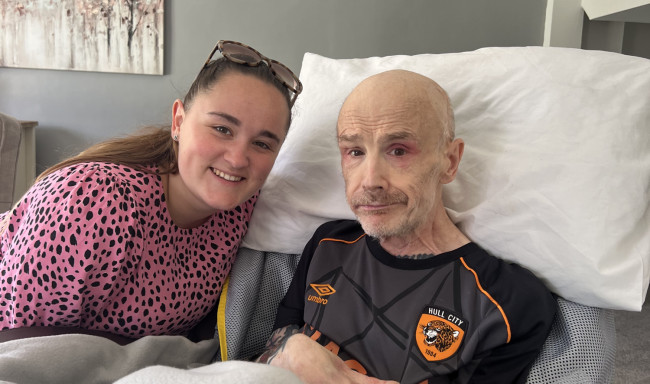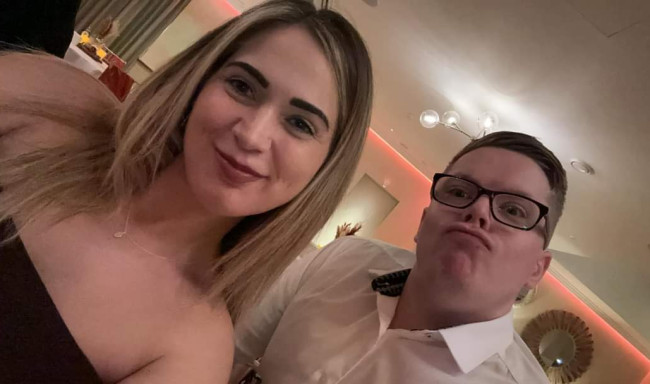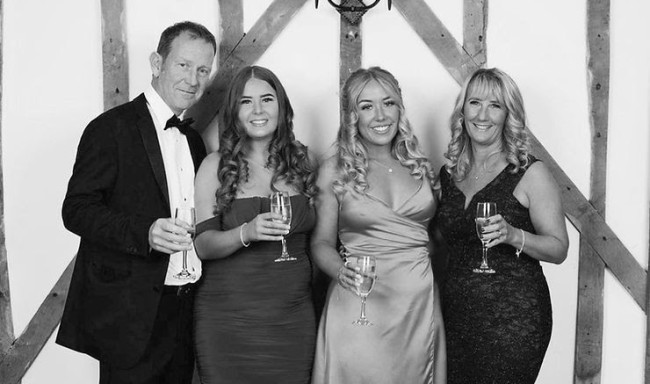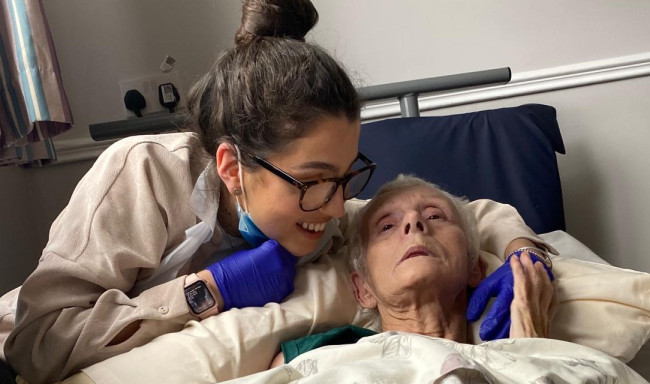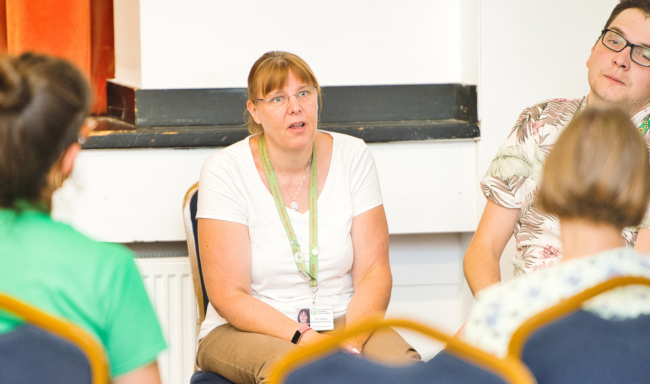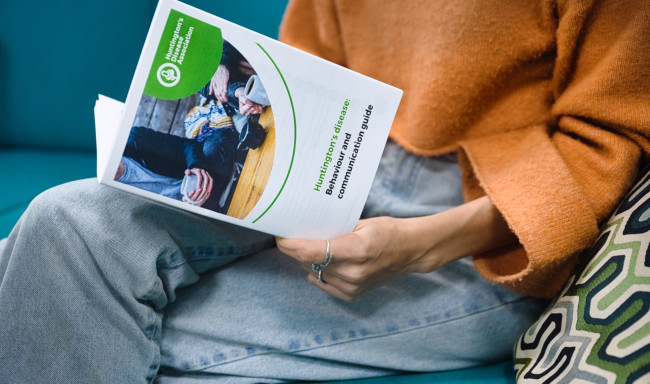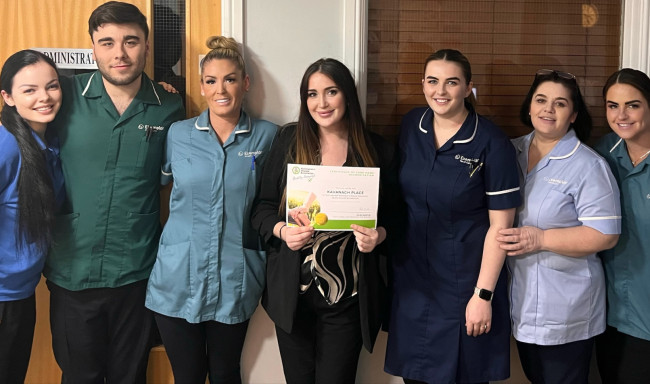Nick tested gene positive for Huntington’s disease around 20 years ago and they have taken this in their stride, keeping an eye on research which could help or delay his symptoms.
One such study highlighted the importance of physical activity on both physical symptoms and wellbeing, so Suzanne managed to persuade Nick to join her in traditional Welsh folk dancing classes.
Nick and Suzanne enjoyed dancing together for several years, finding it made a big difference to Nick’s coordination as he was using his brain and body in a different way.Unfortunately, following a head injury, Nick began to suffer with vertigo, meaning he was unable to dance anymore, and Suzanne began to notice a decline in his mobility. A proactive approach saw Nick’s mobility improve after they both made efforts to get out and about, building his stamina for walking, an activity they have always enjoyed together.
Physical activity background
Suzanne recognises that Nick’s main Huntington’s symptoms are physical; his walking is unbalanced, and his speech is impacted due to a lack of breathing coordination. For both of them, attending specialist yoga classes for people with disabilities has been a lifeline. Nick uses a yoga chair with a backrest for support whilst doing the exercises.
“It’s surprising what he can do if he’s lying on a yoga mat. He hasn’t got to think about holding himself upright so he can tap into other muscles he wouldn’t normally use with day-to-day walking!”
Suzanne says it has taken time for them both to perfect some of the movements.
“It’s important to accept it will take a bit of time, but eventually you’ll realise you can do it!”
The mindfulness and relaxation at the end of the class has helped Nick to keep control of his breath whilst moving, something which used to exhaust him.
Motivating factors for physical activity
The easing of lockdown has been a relief for both Suzanne and Nick, allowing them to resume their love of travelling and exploring. For Nick, walking their dog gives him a purpose to get outside and walk around local parks. Suzanne finds that giving him choices about the route or what time of day they walk gives him control of the situation, encouraging him to get out and be active. They also make sure they are prepared by bringing a raincoat or sun hat which often increases the distance they walk as Nick feels more comfortable. To overcome any fatigue he may experience, Nick uses a rollator with a seat.
“The rollator means we are braver and bolder and walk further when we go out as Nick can rest whenever and wherever he needs to.”
The main motivator for Nick, however, is his passion for travelling. Suzanne often encourages him to walk that extra bit further to build up his strength for upcoming trips. The trips themselves are excellent sources of physical activity, with Suzanne finding they do significantly more steps in new places compared to their usual walks around the neighbourhood. After previously struggling at airports, Suzanne asked for airport assistance on a recent trip to Iceland.
“It’s really important to tell people you need help.”
The extra assistance took out some of the anxieties they both had about travelling, allowing them to continue doing what they love the most. They are both looking forward to an upcoming cruise, for which Suzanne has been very organised in planning ahead. She has booked an accessible room with a wet room to make it easier for Nick to move around and provide extra storage for his equipment. She has also arranged support for when they get there, easing the stress of trying to manage Nick’s wheelchair whilst carrying luggage.
Challenges
Suzanne finds that she and Nick often cannot attend accessible swimming sessions as they are usually timetabled during the working day.
“I think there’s a bit of a misconception that if you’re working, you probably don’t need accessible sessions, and if you do need accessible sessions you’re probably not working. Of course, that is completely untrue.”
Suzanne finds it frustrating that he would have to give up work to attend some of the great classes that would help increase his physical activity.
Physical activity as a carer
Taking a proactive approach, Suzanne makes it her goal to build some routine into their week, walking with Nick on some days and taking yoga classes together on others. However, she also finds it important to keep herself physically active as a carer. She makes sure to find time to prioritise her own physical and mental health by going out and exercising whilst Nick is resting with a cup of tea!
“If I only exercise as much as he’s able to, it’s going to have a massive impact on my health and wellbeing. I think it’s important to say, ‘let’s do a lap around the block,’ and then go back out and do another lap yourself.”
Aiming to hit the recommended 10,000 steps a day, Suzanne often tells Nick the route she is taking when she is going to exercise on her own. This helps Nick visualise where she is going, reducing any anxiety he may have.
At the age of 51, Suzanne took up running, although it was something she admits she used to avoid.
“I started running during the pandemic because I was worried that in the future, being out for a two hour walk would mean leaving Nick in the house on his own for too long.”
Running is advantageous for Suzanne, providing her with an effective 30 minutes of exercise, whilst staying close to her house in case she needs to get home quickly.
Advice to other families
Suzanne kindly offered advice for other families trying to stay physically active with Huntington’s disease.
“It’s never too soon to start. Even if you’re not showing symptoms yet, start now! It’s great for you and great for your family to just get out there. Even starting in your 20s and 30s will have that benefit as you go on. Just find a comfortable place you can walk – it doesn’t have to be glamourous. You don’t have to drive for two hours to get to the beach, sometimes it’s better to just get out your front door. Turn left instead of right one day or walk up the hill instead of down. Enjoy being nosy in your local area!”
This interview was conducted by students from Cardiff University and led by Dr Una Jones. Thank you on behalf of the Huntington's Disease Association for working on these studies as part of a physical activity project.


